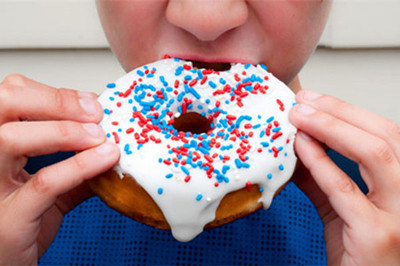(单词翻译:单击)
听力文本
Back in ancient times, philosophers like Aristotle were already speculating about the origins of taste, and how the tongue sensed elemental tastes like sweet, bitter, salty and sour.
"What we discovered just a few years ago is that there are regions of the brain, regions of the cortex, where particular fields of neurons represent these different tastes again, so there's a sweet field, a bitter field, a salty field, etcetera."
Nick Ryba, a sensory neuroscientist at the National Institutes of Health
Ryba and his colleagues found that you can actually taste without a tongue at all, simply by stimulating the "taste" part of the brain—the insular cortex.
They ran the experiment in mice with a special sort of brain implant—a fiber-optic cable that turns neurons on with a pulse of laser light.
And by switching on the "bitter" sensing part of the brain, they were able to make mice pucker up, as if they were tasting something bitter—even though absolutely nothing bitter was touching the tongues of the mice.
In another experiment, the researchers fed the mice a bitter flavoring on their tongues—but then made it more palatable by switching on the "sweet" zone of the brain.
"What we were doing here was adding the sweetness, but only adding it in the brain, not in what we were giving to the mouse."
Think adding sugar to your coffee—but doing it only in your mind.
The results appear in the journal Nature.
Ryba says the study suggests that a lot of our basic judgments about taste—sweet means good, bitter means bad—are actually hard-wired at the level of the brain.
As for that virtual-sugar-in-your-coffee idea?
I think it's basically science fiction to think that this would be something that would be applied to humans."
But today’s science fiction might be tomorrow’s artificial sweetener.
参考译文
古代的亚里士多德等思想家曾经猜测味道的起源及舌头如何感知甜、苦、咸、酸等味道。
“我们几年前的研究曾发现大脑皮层区域中的特定区域神经元代表着不同的味觉,因此就会有甜味区、苦味区、咸味区等等。”

美国国立卫生研究院感官神经科学家尼克?雷巴说道。
雷巴和他的同事研究发现实际上即便没有舌头你也能够尝出味道,而这仅需要对大脑中司职味觉的岛叶皮质进行刺激即可。
这样的结论是基于对老鼠进行的实验,他们在老鼠大脑内植入了光纤电缆,它发射的激光束会刺激神经元。
通过刺激老鼠大脑中的“苦味”感官,老鼠会变得脾气暴躁,即使舌头没有实际接触,它们也仿佛吃了苦一样。
而另外的实验中,研究人员喂老鼠苦味的东西—但却又刺激它们大脑中的甜味区,这样完成了由苦到甜的转变。
“我们做的是增加甜味,但仅仅是刺激老鼠大脑,而不是实际上喂它们真东西。”
想想咖啡里面加的糖—而这次是在大脑里面添加。
这项研究已在《自然》杂志上发表。
雷巴表示这项研究表明,我们对于味道甜味代表着好,苦涩意味着坏等许多基本判断实际上都与大脑相关。
而那个在大脑中加糖的想法?
我想这是科幻小说的观点,将来可能人类会有所应用。
但今天的科幻小说可能就是未来人类添加的那份人工甜味剂。
译文为可可英语翻译,未经授权请勿转载!
重点讲解
1.pucker up 发脾气
例句:The sour candy made me pucker up.
这酸糖果使我酸得武官凑在一起。
2.as if 犹如
例句:To my way of thinking, it didn't seem as if it ought to be so terribly complicated.
我觉得,事情好像没必要这么复杂。
3.switch on 打开,开动
例句:He pointed the light at his feet and tried to switch it on.
他把灯对准自己的脚,试图打开它。
4.science fiction 科幻小说
例句:Be into yoga, science fiction, stamp collecting.
喜爱瑜伽、科幻小说、集邮。


